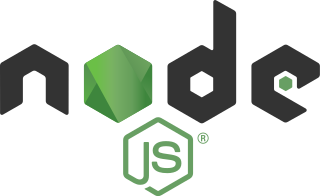
In computing, Common Gateway Interface (CGI) is an interface specification that enables web servers to execute an external program to process HTTP or HTTPS user requests.

Konqueror is a free and open-source web browser and file manager that provides web access and file-viewer functionality for file systems. It forms a core part of the KDE Software Compilation. Developed by volunteers, Konqueror can run on most Unix-like operating systems. The KDE community licenses and distributes Konqueror under GNU GPL-2.0-or-later.
In computing, cross-platform software is computer software that is designed to work in several computing platforms. Some cross-platform software requires a separate build for each platform, but some can be directly run on any platform without special preparation, being written in an interpreted language or compiled to portable bytecode for which the interpreters or run-time packages are common or standard components of all supported platforms.

ActiveX is a deprecated software framework created by Microsoft that adapts its earlier Component Object Model (COM) and Object Linking and Embedding (OLE) technologies for content downloaded from a network, particularly from the World Wide Web. Microsoft introduced ActiveX in 1996. In principle, ActiveX is not dependent on Microsoft Windows operating systems, but in practice, most ActiveX controls only run on Windows. Most also require the client to be running on an x86-based computer because ActiveX controls contain compiled code.

The Microsoft Windows Script Host (WSH) is an automation technology for Microsoft Windows operating systems that provides scripting abilities comparable to batch files, but with a wider range of supported features. This tool was first provided on Windows 95 after Build 950a on the installation discs as an optional installation configurable and installable by means of the Control Panel, and then a standard component of Windows 98 and subsequent and Windows NT 4.0 Build 1381 and by means of Service Pack 4. The WSH is also a means of automation for Internet Explorer via the installed WSH engines from IE Version 3.0 onwards; at this time VBScript became means of automation for Microsoft Outlook 97. The WSH is also an optional install provided with a VBScript and JScript engine for Windows CE 3.0 and following and some third-party engines including Rexx and other forms of Basic are also available.
Windows Management Instrumentation (WMI) consists of a set of extensions to the Windows Driver Model that provides an operating system interface through which instrumented components provide information and notification. WMI is Microsoft's implementation of the Web-Based Enterprise Management (WBEM) and Common Information Model (CIM) standards from the Distributed Management Task Force (DMTF).
Web development is the work involved in developing a website for the Internet or an intranet. Web development can range from developing a simple single static page of plain text to complex web applications, electronic businesses, and social network services. A more comprehensive list of tasks to which Web development commonly refers, may include Web engineering, Web design, Web content development, client liaison, client-side/server-side scripting, Web server and network security configuration, and e-commerce development.

cPanel is web hosting control panel software developed by cPanel, L.L.C. It provides a graphical interface (GUI) and automation tools designed to simplify the process of hosting a web site to the website owner or the "end user". It enables administration through a standard web browser using a three-tier structure. While cPanel is limited to managing a single hosting account, cPanel & WHM allows the administration of the entire server.
PowerBuilder is an integrated development environment owned by SAP since the acquisition of Sybase in 2010. On July 5, 2016, SAP and Appeon entered into an agreement whereby Appeon, an independent company, would be responsible for developing, selling, and supporting PowerBuilder.
Software deployment is all of the activities that make a software system available for use.
Active Scripting is the technology used in Windows to implement component-based scripting support. It is based on OLE Automation and allows installation of additional scripting engines in the form of COM modules.

Adobe AIR is a cross-platform runtime system currently developed by Harman International, in collaboration with Adobe Inc., for building desktop applications and mobile applications, programmed using Adobe Animate, ActionScript, and optionally Apache Flex. It was originally released in 2008. The runtime supports installable applications on Windows, macOS, and mobile operating systems, including Android, iOS, and BlackBerry Tablet OS.
Kloxo was a free and open-source web hosting control panel for the Red Hat and CentOS Linux distributions. As of October 2017, the project has been unmaintained with a number of unresolved issues, and the project's website is offline.
Morfik Technology Pty Ltd. is an Australian software company that was acquired by Altium in 2010.

Virtualmin is a domain hosting and website control panel which gives the ability to create and manage many domains, as well as simplify both automation and tasks. It is based on Webmin. Virtualmin is an alternative to cPanel and Plesk.

Node.js is a cross-platform, open-source JavaScript runtime environment that can run on Windows, Linux, Unix, macOS, and more. Node.js runs on the V8 JavaScript engine, and executes JavaScript code outside a web browser.

Geeklog is open-source software that works as a Weblog, CMS or Web Portal." It is written in PHP and during its history has supported MySQL/MariaDB, PostgreSQL, or Microsoft SQL Server as a database backend.
PHProjekt is a free groupware and project management web application written in PHP. It was created in the late 1990s by Albrecht Günther; since early 2006, Mayflower GmbH develops and supports PHProjekt along with Günther.
The following outline is provided as an overview of and topical guide to the Perl programming language:
Softaculous is a commercial script library that automates the installation of commercial and open source web applications to a website. Softaculous scripts are executed from the administration area of a website control panel, typically via an interface tool such as cPanel, Plesk, DirectAdmin and InterWorx. Softaculous applications typically create tables in a database, install software, adjust permissions, and modify web server configuration files.






